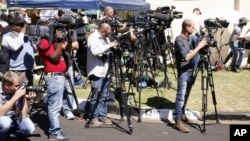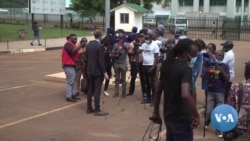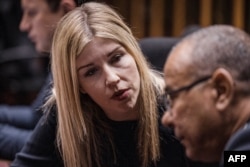It ranges from newsroom raids and arrests to attacks on reporters covering elections to legal challenges impeding their work: Across Africa, media are being obstructed.
And while some incidents take place in countries with poor records for media freedom, analysts are also seeing cases in vibrant democracies like Botswana and South Africa.
"Although the number of journalists imprisoned or killed in connection to journalism is not as high as may be the case elsewhere on the continent, there are other press freedom violations in southern Africa that are deeply concerning," said Angela Quintal, Africa program director at the Committee to Protect Journalists, or CPJ.
One example is a raid by Botswana's intelligence services in late July on the offices of Mmegi, a leading newspaper, during which agents confiscated devices and arrested an editor, Ryder Gabathuse, and reporter Innocent Selatlhwa.
The reason for the raid was not clear but local media organizations said that the newspaper had published critical articles about the spy agency and had been reporting on a feud between the current president and his predecessor.
Authorities released the journalists without charge and the intelligence services apologized for the conduct of the agents involved. One agent is alleged to have said when asked for a warrant, "I am a warrant myself."
Gabathuse told VOA that the authorities offered to return the phones and laptops, but his newspaper declined, wary that the devices may have been tampered with. The agency provided them with new equipment.
The CPJ in recent years has documented the use of Cellebrite technology in the country. Quintal said Cellebrite can be used "to extract and analyze thousands of messages, call logs, emails, and web browsing history from phones and other devices confiscated from journalists," adding, "The implications for source protection are huge."
Asked whether he felt Botswana's press freedom was in jeopardy, Gabathuse said, "Now and in the past, there were recorded incidents that depicted the government's heavy handedness in dealing with the media."
Press freedom is there but "under threat," he said.
Media analysts will keep a close eye on conditions for media in Botswana as the country heads to the polls next year.
Campaign trail
Elections often bring increased risks for journalists covering the campaign, such as in Zimbabwe, which holds elections in late August.
The Media Institute of Southern Africa has documented around a dozen assaults and media violations in the country in recent months.
In July, supporters of the ruling ZANU-PF party assaulted three freelance journalists in the city of Bulawayo.
One of those attacked was Lungelo Ndhlovu, who contributes to the Thompson Reuters Foundation.
The journalist said that he and the others — VOA contributor Annahstacia Ndlovu and freelancer Pamenus Tuso — had heard of skirmishes between supporters and vendors near the market on July 17 and went to check it out.
"When we arrived, we started interviewing the affected vendors and then the ZANU-PF members came and ordered us to delete all the footage. We identified ourselves but they continued ordering us to delete. During that melee, I was slapped on the face while others were beating me at the back," he said.
The reporters filed a statement with police, but Ndhlovu said no one has been arrested and he doesn't feel safe as the country gears up for elections.
"The recent assaults on the three journalists in Bulawayo is unfortunately part of a predictable pattern," said Quintal.
"Then there is the Patriot Act which remains a real concern for Zimbabwean journalists. The Media Alliance of Zimbabwe is challenging its constitutionality in the High Court," she added.
Zimbabwe's minister for information, Monica Mutsvangwa, did not respond to a VOA message requesting comment but has previously defended the law.
In a separate incident in the capital, Harare, in July, Columbus Mavhunga was detained on accusations of using an unlicensed drone.
Mavhunga, who contributes to VOA, denied that was the case and said he had a permit. "I can't rule out about silencing me for my reportage," Mavhunga said, adding that he is not the only reporter to face challenges at this time.
Legal action
In neighboring South Africa, a number of incidents have raised concern. Among them, lawsuits filed against news outlets and problems concerning media accreditation.
In June, South Africa's courts heard a case filed by former President Jacob Zuma against journalist Karyn Maughan and another that a group of companies filed against muckraking investigative outlet amaBhungane.
While the journalists were victorious in both instances, CPJ's Quintal said that lawsuits are often used with the aim of "bankrupting media outlets or tying them up in legal battles."
Media access is another issue, prompting the Foreign Correspondents' Association of Southern Africa to put out a statement appealing to the government to "revert a recent trend that has seen it curbing media coverage of international meetings and events" in the run-up to South Africa's hosting of the BRICS summit later this month.
The group said foreign media had been excluded from some meetings ahead of the event, which includes emerging nations South Africa, Brazil, India, Russia and China. The action meant that some journalists had to rely on government handouts, it noted.
"We find it unacceptable that a democratic country would curtail media freedom in such a manner," the association added.
Elsewhere on the continent, the Media Council of Kenya issued a statement in July warning authorities of the dangers of police posing as journalists after a video appeared to show an undercover officer standing with journalists before making an arrest during anti-government protests.
"Impersonation of journalists by the police is a grave unprofessional misconduct on the part of the police and endangers the lives of journalists in the line of duty," the body said in a statement.
The council added that some journalists were briefly arbitrarily detained at the protests.
While data from media groups shows that many of these countries are not the worst offenders when it comes to press freedom, CPJ's Quintal said, "A healthy media freedom environment goes beyond whether journalists are jailed or killed in connection to the work."













